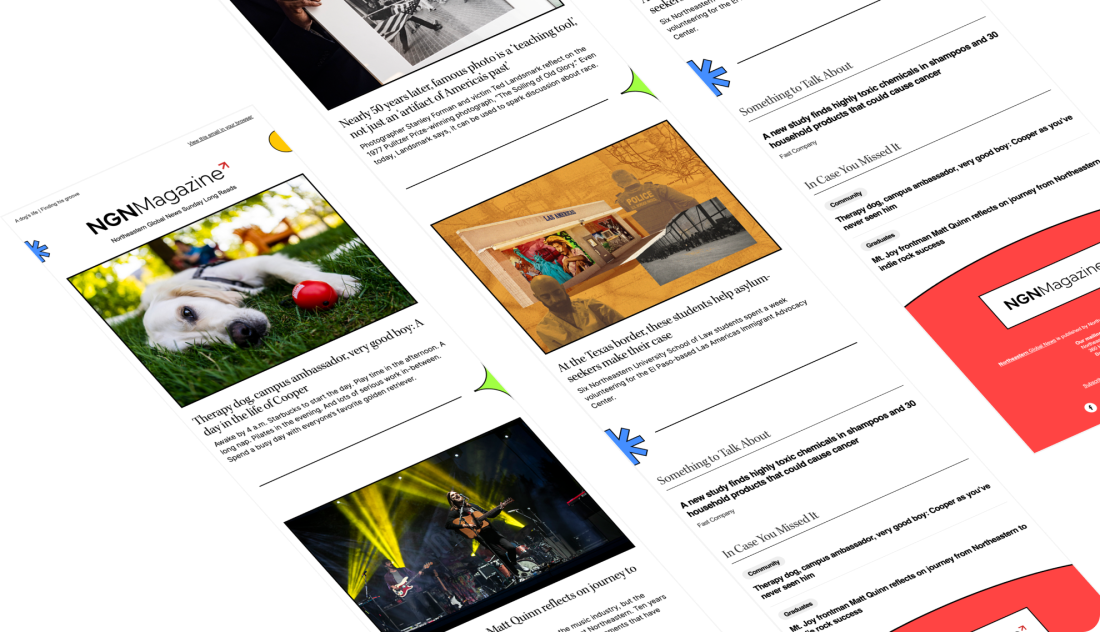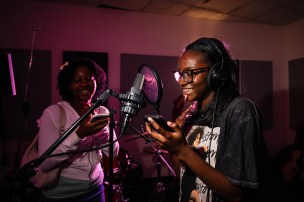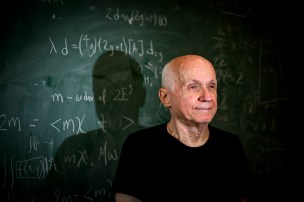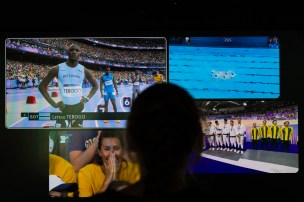Published on
From TD Garden to Fenway Park, graduate student speaker Megan Carter is a hockey and academic star
Carter pursued dual degrees while completing two co-ops at Northeastern. She expects to play in the PWHL before entering medical school.
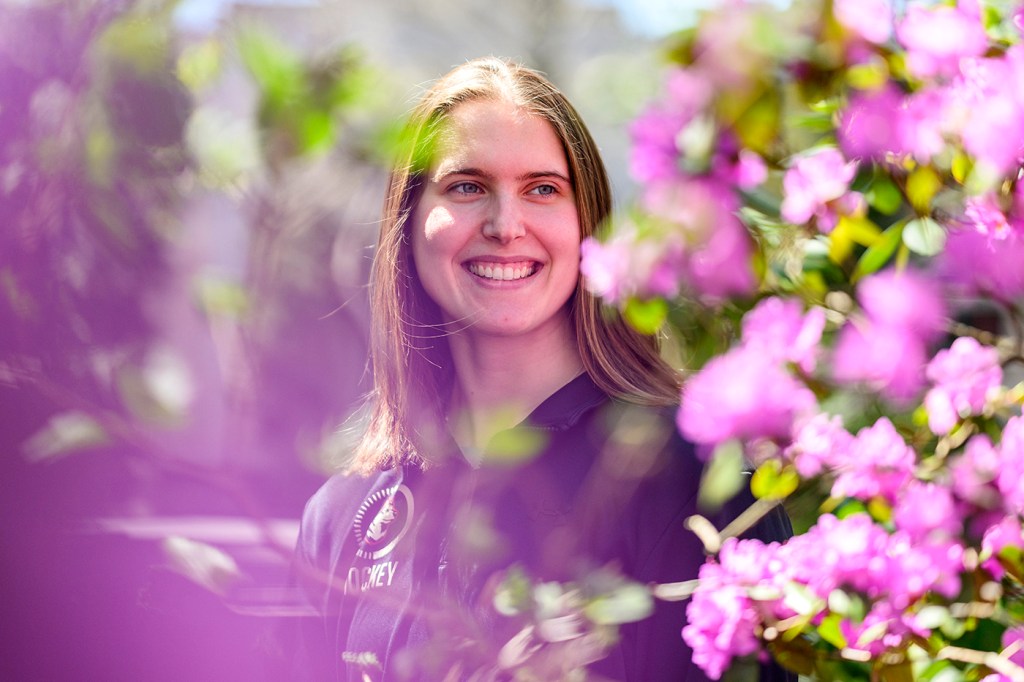
When Megan Carter takes the Fenway Park stage Sunday as the student speaker at Northeastern University’s graduate commencement ceremony, she’ll be drawing from five years rich with experience.
Carter leaves Northeastern as a hockey star who reached three NCAA Frozen Fours while earning dual degrees and completing two co-ops at Boston hospitals. She expects to play in the Professional Women’s Hockey League as a high draft pick next season, to be followed by a medical career.
“There’s a couple of messages that I want to get through,” Carter says of her commencement address. “One is about being where you’re meant to be — and even in a situation where it may not be totally clear, just being resilient and doing things that you enjoy doing. Having a mentality where you get to do this, you don’t have to do this.
“And also,” she says of her second theme, “just being so grateful for the people around us that have helped us overcome adversity, which facilitates a learning journey.”
As she ends this segment of her journey, Carter believes the moment at America’s oldest ballpark won’t be overwhelming.
“To speak in front of that crowd is going to be more exciting than nerve-wracking,” Carter says. “I think playing in front of 11,000 fans at TD Garden maybe was a good stepping stone for that.”
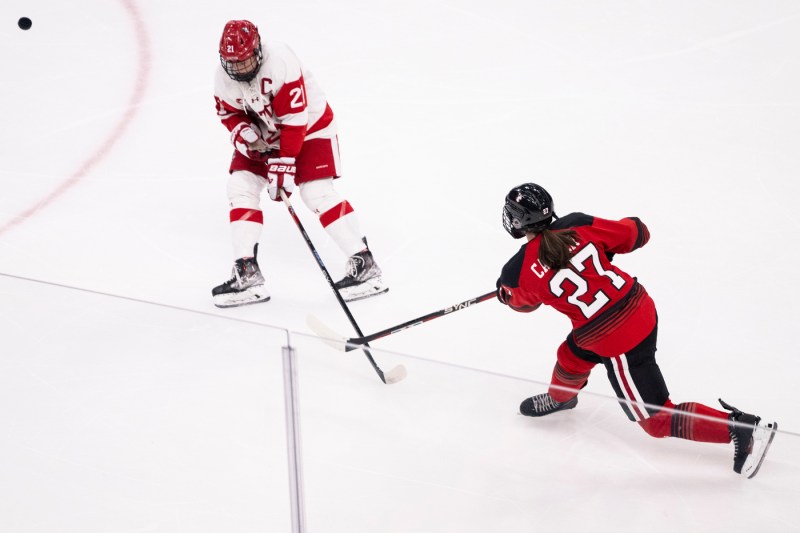
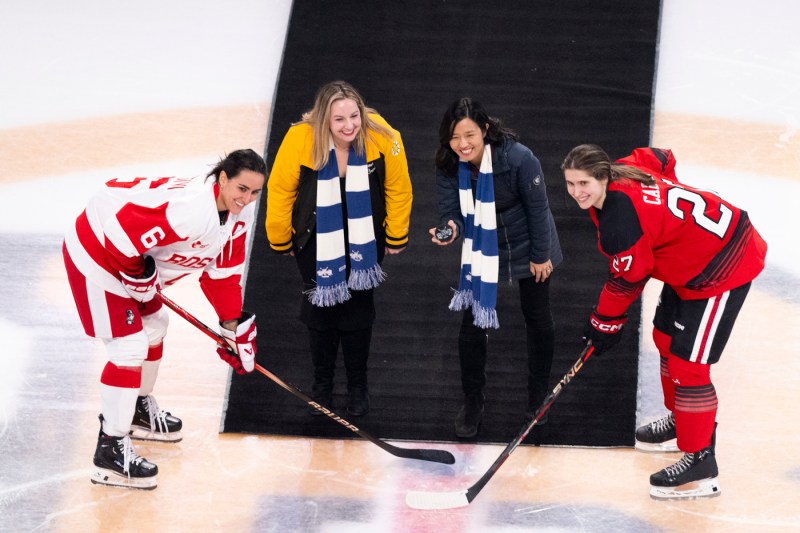
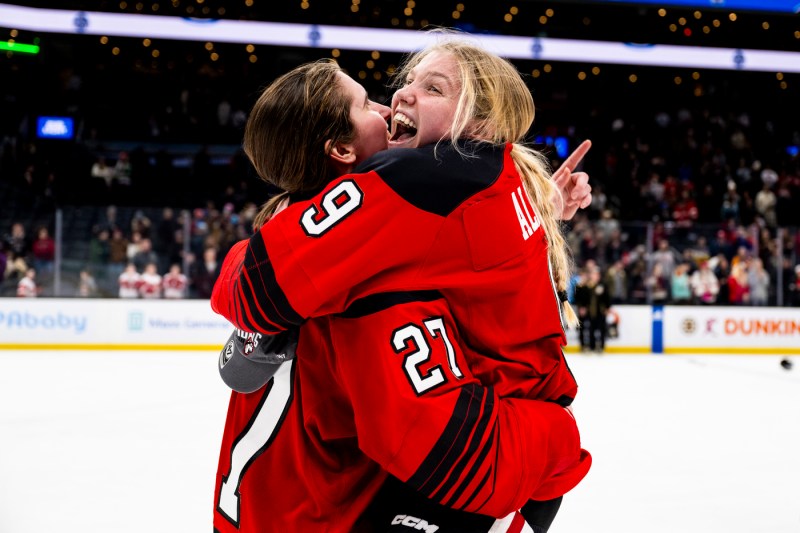
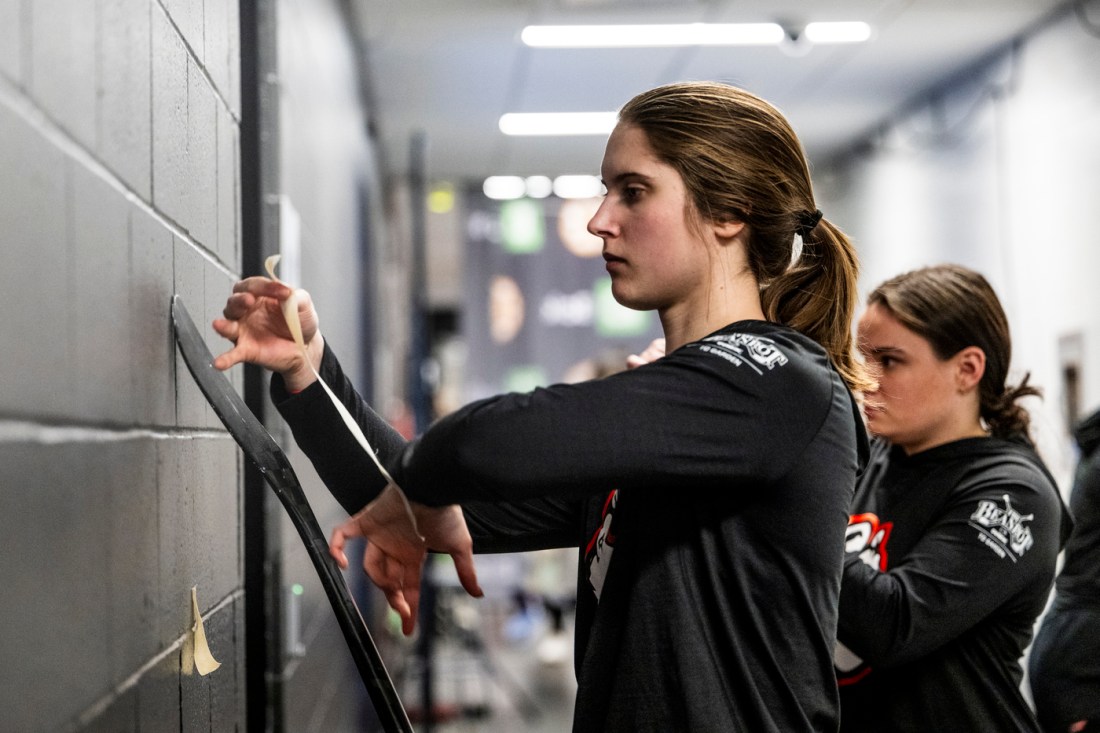
Carter, as team captain, helped lead her Huskies to a historic overtime win in January over Boston University in the first Women’s Beanpot title game held at TD Garden. It was attended by 10,633 fans — a record for women’s hockey in New England.
It’s been an intensive five years for Carter, who:
- Earned a bachelor’s degree (4.0 grade point average) in biology.
- Will graduate with a master’s degree in human movement and rehabilitation science.
- Earned the NCAA’s Elite 90 award as the top student at three straight Frozen Fours.
- Served as president of Northeastern’s Student-Athlete Advisory Council.
- Was honored as the top defender in Hockey East this season.
“I definitely tried to jam a lot in, especially the last couple of years,” Carter says. “But it’s been worth it to build the resume and become well-rounded in trying to focus on hockey, focus on school, but then also focus on the student-athlete community in Northeastern — and also the Boston community and giving back. It’s been a journey and a really fun one.”
Along the way Carter deepened her perspective on the role of sports in her life — a symbiosis of heart and mind.
‘Megan has set the standard’
Carter, a Canadian, grew up playing hockey in Milton, Ontario, an hour west of Toronto.
“You start comparing schools across the NCAA and obviously hockey’s a factor, but there’s also the academic side of things,” Carter says. “When you can go to a school that has a co-op program in a medical hub in Boston, it aligns with my career goals beyond hockey.”
In her sophomore, junior and senior seasons, Carter contributed to Northeastern teams rated among the top five nationally while advancing to the Frozen Four, a streak triggered by the 2020-21 team that lost the NCAA championship game in overtime to Wisconsin. During that run of success Carter had to learn how to respond constructively to the losses.
“Even though we’d won Hockey East championships and those mean so much to us, it was a huge adversity for this team to get there three times in a row and come up short,” she says of the Huskies’ journeys to the final four of their sport. “That ultimate championship in the NCAA was really what we all had our eyes set on. We would have loved to win it.
“But at the end of the day it’s the lessons throughout the season and from those games where you have to find the pride in making it there. We did everything we possibly could to be prepared. We overcame so much to get there. That’s something that we can hold near and dear to our hearts.”
The Elite 90 academic awards that Carter received at each Frozen Four were recognition of her excellence in both the academic and athletic worlds.
“To win it three times is something that’s so unimaginable,” she says. “It meant so much to me because I pride myself in being able to balance top academics and top athletics, and I think the award encompasses that. It wouldn’t be possible without the support of my teammates and my coaches and professors and my family, and it’s something I’ll be proud of for a long time.”
While much has been made of her leadership athletically, Carter says she was equally aware of setting the example academically for her teammates.
“Our younger players see Megan, who is so gifted athletically and carries the demands of her rigorous course load, and their only option really is to follow in her footsteps,” Northeastern women’s hockey assistant coach Lindsay Berman says. “We’ve seen some younger players come in as good students — but then they see someone like Megan and now they’re striving to be excellent students. Megan has set the standard and we’re going to miss that, but hopefully we’ll have some players behind her that will follow in those footsteps.”
For the past year Carter has served as president of the student-athlete committee, which provides leadership opportunities while elevating communication with the athletic administration. Carter focused the organization on a variety of community initiatives that enabled local children to view the athletes as people who care about them.
“We’ve had the goal of giving back to the community since COVID,” says Carter, who particularly enjoyed a recent girls in sports festival covering grades one through eight.
“We just played sports with them all day,” Carter says. “How to throw a frisbee or football, playing basketball and dodgeball, just showing young girls that we were in a position that they could be in one day. It’s about having the people ahead of you so that you can have those dreams.”
A pro hockey career?
Carter is expected to be picked in an early round of the PWHL draft in June. Her plan is to play hockey for as long as she can in the new league as well as for the Canadian national team. Berman finds herself wondering what Carter might accomplish when she’s able to focus all of her efforts on hockey.
Featured Posts
“She’s elite in every way and really detailed,” Berman says. “If you walk into a rink, she might not be the first player you notice. But the more you watch her, the more you notice that she doesn’t get beat. She makes subtle plays. Defensively she’s physical, she’s calm and she’s got a presence about her. The cool thing about Megan is that she’s gifted but she works hard at it. She’s in every week for video, she always wants to do extra skills, she takes practice as seriously as she takes games.”
Carter at one time thought she may aim to be a surgeon. Now she’s also considering a career in sports medicine with the potential goal of becoming a team doctor.
During her initial four years, Carter studied with teammate Alina Mueller, who graduated in behavioral neuroscience before earning a master’s in human movement and rehabilitation sciences. Mueller departed to the PWHL as Northeastern’s all-time leading scorer.
“We’ve joked that once hockey’s over we’ll start a (sports medicine) practice together and have Katy Knoll come in and be our accountant,” Carter says of Knoll, a departing business administration major who ranks 15th all-time at Northeastern with 131 points. “That’s another thing that’s very special about my time here is that these are friends that I will have for the rest of my life. And they’re all going to be so successful having that Northeastern education and experience.”
‘I made an impact’
Carter began her fifth season (an extra year granted to all NCAA athletes after the COVID-19 pandemic) as team captain based on a vote by her fellow players. It turned out to be a hard year. Not only did she suffer an early-season injury, but the Huskies needed to create a new identity following the departures of current PWHL stars Mueller, Chloé Aurard and Maureen Murphy, who had combined for 669 points.
The Huskies struggled to an 8-8 start amid inconsistent scoring. Their response to those early-season difficulties taught Carter lessons that she’ll apply to her future careers.
“The leadership group, and Megan in particular, had a lot of pressure on them because of the standard that had been set with our success in the last five or six years,” Berman says. “Megan was the one who would say, ‘Let’s stick together.’ She was the glue that kept everybody believing and working for it. And then we got out of [the slump] and I don’t think we do that without her leadership.”
The Huskies would go 17-3-3 after Thanksgiving, rising to No. 2 in Hockey East and reaching the conference title game at Connecticut.
“When we started to turn things around, I think it was when I realized I needed to spread the weight over everyone and make it more of a united front and a collective journey — versus me taking on the weight of the world and trying to steer the ship that way,” Carter says. “It was a great year to be captain because of that resiliency and that adversity that we faced. To have to problem-solve and get people on the same page was a unique experience that I hadn’t had before. So it was an experience that will serve me well.”
The Huskies were moments away from a seventh straight Hockey East title and its accompanying NCAA tournament bid when they lost, 1-0, in overtime of the conference championship.
“There was a sense in me that I had let the team down,” Carter says. “And that changed pretty quickly.”
It changed when Carter was approached by her fellow players in the locker room.
“All my teammates were coming up to me and saying ‘Thank you for everything that you’ve done,’” says Carter. “Like, ‘You were such a great captain.’ ‘You’ll always be my captain.’ ‘You’ve done so much for this program.’
“I was overwhelmed with emotion,” says Carter, her eyes welling with the memory. “I’m getting emotional right now. They taught me in that moment that they had seen the bigger picture, the work that was put in behind the scenes, the trajectory that we took. So that was very, very special and rewarding to get the feeling that I made an impact while I was here.”
Ian Thomsen is a Northeastern Global News features writer. Email him at i.thomsen@northeastern.edu. Follow him on X/Twitter @IanatNU.

